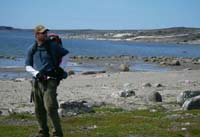|
|

|
|
The Nuvvuagittuq greenstone belt - a swathe of bedrock in Canada - has been identified as the oldest place in the world, dating back some four billion years
|
The oldest rocks on Earth have been discovered in Canada, offering scientists a glimpse at the origins of the planet, announced scientists in a study to be published Friday.
The rocks, found in a belt of ancient bedrock in Quebec, are estimated to be 4.28 billion years old.
The find pushes back the age of the most ancient discovered remnants of the Earth's crust by 300 million years.
"Our discovery opens the door to further unlock the secrets of the Earth's beginnings," said Jonathan O'Neil, lead author of the study and a geologist at McGill University in Montreal, who collected and analyzed the rocks.
"Geologists now have a new playground to explore how and when life began, what the atmosphere may have looked like, and when the first continent formed," said O'Neil.
The rocks also suggest that continents formed very early in the Earth's history, said Richard Carlson at the Carnegie Institution in Washington, co-author of the study, to be published in the September 26 edition of the journal Science.
Estimates of the rocks' age were made using isotopic dating, a technique which can only be used to date rocks roughly 4.1 billion years old or older.
This is the first time the technique has been used to date terrestrial rocks, because nothing else this old has ever been discovered on Earth.
The specimens were found in an area known as the Nuvvuagittuq greenstone belt, along the eastern shore of Hudson Bay in northern Quebec, a region recognized in 2001 as being a potential site for finding ancient rocks.
点击查看更多双语新闻
(Agencies)
|
科学家将于本周五发表的一项研究报告中公布,他们在加拿大发现了目前地球上最古老的岩石,这一发现为科学家研究地球起源提供了新的线索。
这些岩石是在加拿大魁北克省的一个古岩床带发现的,据估计距今已有42.8亿年历史。
这一发现将地壳最古老残留物的年代又向前推了3亿年。
研究报告主要撰写者、蒙特利尔迈克基尔大学的地质学家乔纳森•奥尼尔对这些岩石进行了收集和分析,他说:“我们的发现为进一步探索地球的起源打开了一扇门。”
“地质学家现在有了一个新的平台,去探究生命何时以及如何起源、当时的大气状况以及第一块大陆何时形成等问题。”
研究报告撰写者、华盛顿卡内基研究所的理查德•卡尔森说,这些岩石还说明,陆地在很早的时期就形成了。该研究在9月26日的《科学》期刊上发表。
这些岩石的年龄是经过“同位素测年法”测定出来的。同位素测年法只能够用于测定至少有41亿年历史的岩石的年代。
这一方法首次被用于测定陆地岩石的年代,因为之前在地球上还没有发现过这么古老的东西。
这些岩石发现于魁北克省北部哈德森湾东海岸沿线的Nuvvuagittuq 绿石带。2001年,地质学家鉴定有望在这一地区发现古岩石。
(英语点津姗姗编辑)
|